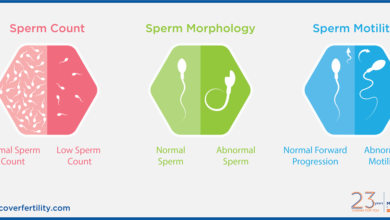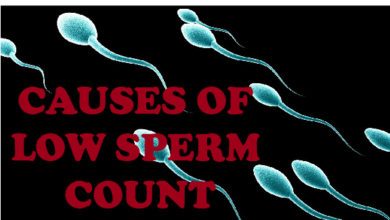
Low sperm count-oligospermia sumerized
Oligospermia (Low sperm count) is generally defined as less than 20 million spermatozoa per one mililitre of ejaculate. It is also called Oligozoospermia. Even though it takes one sperm to fertilize an egg, it takes millions of functioning sperms to produce the enzymes needed to get through de cloud of cells dat surround an egg.
Causes of Oligospermia
– Varicocele- an enlarged vein in de testicle.
– Testicular injury (Trauma).
– Swelling of de testicles frm infection such as mumps (gemerekutu), gonorrhoea, chlamydia etc.
– Klinefelter syndrome- chromosome disorder.
– Cryptorchidism- failure of one or both testicles to descend.
– Chemotherapy and radiation.
– Cystic fibrosis- lack of de tubes dat carry de sperm out of the testicles.
– Retrograde ejaculation- a condition where sperms are moved into de bladder instead of out of de penis.
– Obesity.
– Excessive stress- stress hormones block Leydig cells which regulate testosterone production.
– Malnutrition.
– Smoking- Causes slugging movement of spermatozoa.
– Excessive alcohol intake- Too much alcohol affects liver function which causes a spike in oestrogen levels.
– Certain drugs- eg. anabolic steroids. Can shrink the testicles.
– Excessive bicycle or horseback riding.
– Prostatitis.
– Obstruction of the ejaculatory duct.
Diagnosis of Oligospermia
Diagnosis is based on:
– Medical and sexual history.
– Testing for sexually transmitted infections.
– Semen analysis.
Classification of oligospermina
1. Mild Oligospermia: 10-20 million sperms/ml.
2. Moderate Oligospermia: 5-10 million sperms/ml.
3. Severe Oligospermia: < 5 million sperms/ml.
How to boost sperm count
– Avoid wearing tight pants, rather wear loose, cotton boxer shorts.
– If possible sleep without underwear so dat your testicles stay cooler.
– Avoid hot baths.
– Reduce and manage ur stress levels. Get enough sleep.
– Reduce alcohol intake.
– Stop smoking.
– Loose or gain weight as needed.
– Eat healthy foods-a diet dat is low in fat, and rich in protein is gud for sperm production.
– Also, eat vegetables, whole grains, fish, eggs, coconut, fruits and vegetables.
– Vitamin C, Vitamin E, Zinc and Selenium supplements are also gud for sperm production.
– Exercise regularly- exercise releases testosterone into de body which helps in sperm production. However, avoid strenuous exercise.
– Get tested and treated for STIs.
– Avoid drinking too much coke. Studies have shown dat men who drink coke regularly have 30% less sperm than men who do not.
– Avoid excessive riding of bicycle and horse.
More Terminologies
OLIGOSPERMIA: Less dan 20 million spermatozoa per one ml of ejaculate.
NORMOSPERMIA: A sperm count of 20 million or more with all the other parameters being normal.
AZOOSPERMIA: No spermatozoa in de ejaculate.
ASPERMIA: No ejaculate at all.
ASTHENOZOOSPERMIA: Fewer dan 50% spermatozoa with forward progression.
TERATOZOOSPETMIA: Fewer dan 50% spermatozoa with normal morphology.
Oligoasthenoteratozoospermia: a disturbance in count, motility and morphology.
Incomplete Liquefaction: The seminal fluid which contains the sperm becomes too think for the sperms to move around properly even after several hours.
Discover more from MedCircles Ghana
Subscribe to get the latest posts sent to your email.




